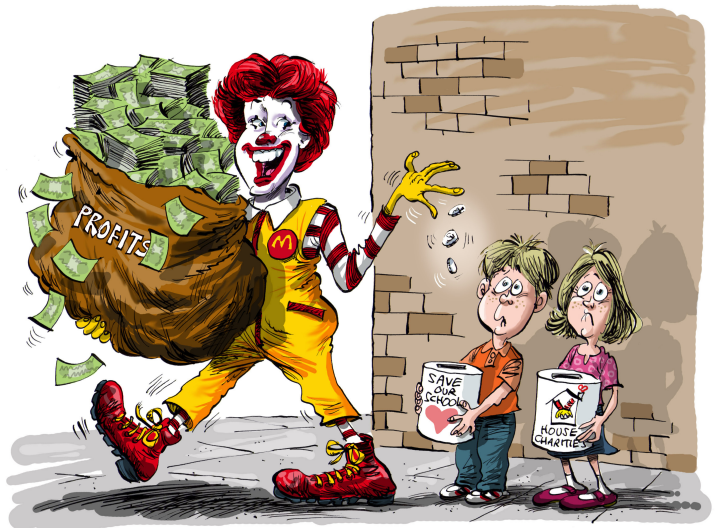McDonald’s Criticized For Using Ronald McDonald House For Cheap Publicity
According to the report [PDF], Clowning Around With Charity, from Corporate Accountability International, that McDonald’s only provides about 20% of the funding globally for Ronald McDonald House Charities and that the actual Ronald McDonald Houses only get about 10% of their money from the company whose name they share. Moreover, some of that money comes not from the sale of McNuggets and Big Macs, but from the donation boxes set up at the restaurants’ counters.
Many RMHC websites carry a disclaimer that reads something like this:
The McDonald’s Corporation provides a license agreement allowing each Ronald McDonald House to use the trademarks of the corporation. Each Ronald McDonald House is governed in full by a separate Board of Directors, establishes its own mission and policies and manages its own budget and fundraising process. Assets are not co-mingled. It is the responsibility of each Ronald McDonald House chapter to cultivate a fundraising relationship with their local McDonald’s owner/operators.
It’s rare for a charitable foundation to receive all its funding from one corporate source, but the report claims that, while McDonald’s may provide distance from the charities in the fine print, the public perception is that the fast food chain and the Ronald McDonald Houses are one in the same.
One House operator admitted to the author of the report that “it’s a common misperception” that Ronald McDonald Houses receive 100% of their funding from McDonald’s HQ. Another called the relationship between the two entities “absolutely confusing.”
The report does not criticize the mission or practices of the Ronald McDonald Houses, but instead takes issue with the fast food chain’s use of the charities as a way to reap positive publicity with minimal costs.
“While there’s no disputing that Ronald McDonald Houses provide families in need with tremendous support, they also serve as brilliant marketing and blame-deflection vehicles,” says one physician and assistant professor from the University of Ottawa in the report.
The author alleges that McDonald’s is including the many millions contributed by customers via in-store donation boxes as part of its overall giving to RMHC. If so, that means the company itself is providing less than 10% of local House funds.
In all, the report estimates that McDonald’s only spends about .32% of its pre-tax profits on charitable giving, compared to an average of 1.01% for similarly large corporations. Yet the Golden Arches is frequently highlighted in TV news stories about the positive things being done by Ronald McDonald Houses.
“These often lengthy segments effectively associate the fast food brand with good works, present McDonald’s as an exemplary corporate citizen… and conflate a worthy health-focused charity with a business that actively undermines public health,” reads the report. “Often the news promotes a local fundraising effort, so McDonald’s gets free exposure without even having to contribute to the charity that the news is covering.”
It’s not just the company’s connection to Ronald McDonald Houses that is criticized in the report. The author also takes the McDonald’s to task for events like McTeacher’s Night, wherein teachers work at a local McDonald’s eatery and part of the money raised from food sales is slated to go back to the school. But in the end, some schools are only seeing a return of about $1 per student from McTeacher’s Night.
The report calls on McDonald’s to rename the charities, retire Ronald McDonald, and stop marketing in schools.
But we’re guessing by the company’s response to the report that it won’t be doing any of those things.
“McDonald’s categorically rejects this self-serving and biased document and stands proud of the significant financial support and volunteer hours we have and will continue to provide to Ronald McDonald House Charities and other charities worldwide,” a rep for the company tells USA Today.
Want more consumer news? Visit our parent organization, Consumer Reports, for the latest on scams, recalls, and other consumer issues.


